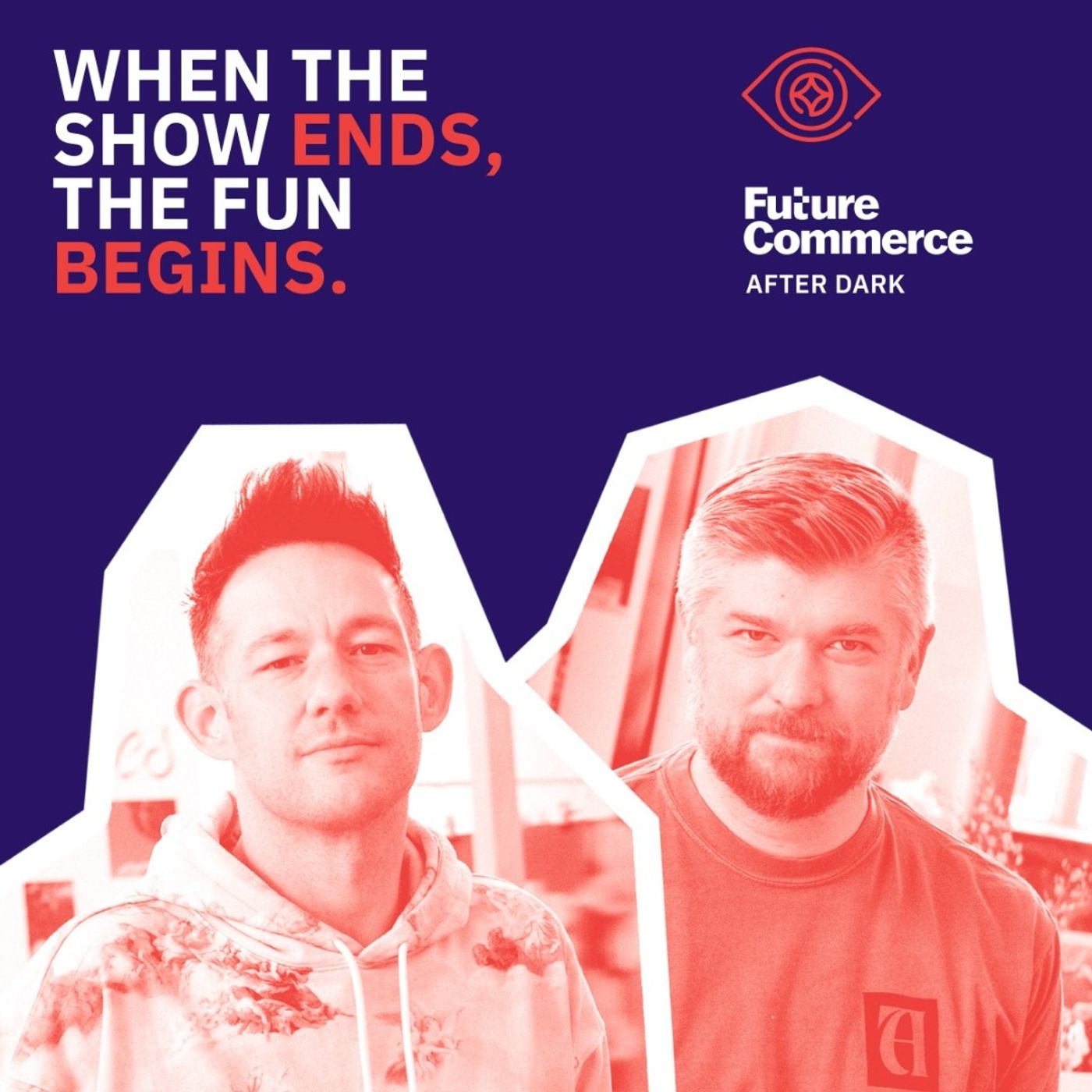Discover Future Commerce
Future Commerce

Future Commerce
Author: Phillip Jackson, Brian Lange
Subscribed: 292Played: 12,050Subscribe
Share
©2025 Future Commerce
Description
Future Commerce is the culture magazine for Commerce. Hosts Phillip Jackson and Brian Lange help brand and digital marketing leaders see around the next corner by exploring the intersection of Culture and Commerce.
Trusted by the world's most recognizable brands to deliver the most insightful, entertaining, and informative weekly podcasts, Future Commerce is the leading new media brand for eCommerce merchants and retail operators.
Each week, we explore the cultural implications of what it means to sell or buy products and how commerce and media impact the culture and the world around us, through unique insights and engaging interviews with a dash of futurism.
Weekly essays, full transcripts, and quarterly market research reports are available at https://www.futurecommerce.com/plus
Trusted by the world's most recognizable brands to deliver the most insightful, entertaining, and informative weekly podcasts, Future Commerce is the leading new media brand for eCommerce merchants and retail operators.
Each week, we explore the cultural implications of what it means to sell or buy products and how commerce and media impact the culture and the world around us, through unique insights and engaging interviews with a dash of futurism.
Weekly essays, full transcripts, and quarterly market research reports are available at https://www.futurecommerce.com/plus
636 Episodes
Reverse
We’re live and poolside at the close of eTail Palm Springs. This year’s conference brought less theory and more proof, from agentic platforms doing actual operational work to the quiet rise of go-to-market tooling among merchants. One thing is clear: AI stopped talking and started shipping. Brian and Phillip break down the sessions, hallway conversations, and briefings that mattered most, and dive into their marathon week of discussions with companies including CommerceIQ, Attentive, Resolve AI, Decile, Modem, and more.
The Year AI Stopped Talking and Started Working
Key takeaways:
Agentic AI is operational now. Platforms like CommerceIQ are replacing FTE-style workflows, running around the clock, and proactively surfacing insights.
Context is everything… and most native AI tools don't have it. In-tool AI using synthetic or siloed data is producing unreliable outputs. The winning stack integrates across all data sources.
CRM is mainstream; go-to-market tooling is emerging. Merchants are now using tools like Clay, a tool built for B2B sales prospecting, to find creators, influencers, and strategic partners.
Clienteling looks different when repurchase cycles are a decade long. Brands like Ernesta (custom rugs) and GHD (hairstyling tools) are rethinking loyalty and relationship-building without the luxury of frequent transactions.
"Consolidation is power." Whoever consolidates information, tasks, and systems the best will hold the advantage, both in business and in AI.
Quotes:
[00:20:15] "The marketing agent is looking for a segmentation issue... high CAC and low LTV. Those are things that, as an organization, you'd have to surface, invest in, create segments, create a dashboard — and then bother to look at." — Phillip
[00:37:38] "The job of the RFP responder is the same as the code developer. They become a shepherd and a reviewer rather than a writer." — Brian
[00:48:03] "What do we lose when we eliminate the mundane?" — Brian
[00:51:09] "In the next six months, AI is going to own entire workflows without any human intervention." — George Davis, CMO of Cozy Earth (as quoted by Phillip)
In-Show Mentions:
Listen to Kristin Flor Perret’s episode on Future Commerce
Get on the list for our ShopTalk Spring After Party
Associated Links:
Check out Future Commerce on YouTube
Check out Future Commerce Plus for exclusive content and save on merch and print
Subscribe to Insiders and The Senses to read more about what we are witnessing in the commerce world
Listen to our other episodes of Future Commerce
Have any questions or comments about the show? Let us know on futurecommerce.com, or reach out to us on Twitter, Facebook, Instagram, or LinkedIn. We love hearing from our listeners! Hosted by Simplecast, an AdsWizz company. See pcm.adswizz.com for information about our collection and use of personal data for advertising.
Jonathan Cohen, CMO of Onyx Global Group (Pure Daily Care & Aquasonic), joins Phillip and Alicia to trace the arc from Amazon-first launches to TikTok Shop dominance. This week, we unpack the unmeasurable and explore what it actually means to cede your marketing playbook to a creator economy that doesn't need your permission.
Control Is Overrated, Anyway
Key Takeaways
Creators are the new CMOs. Brands don't cascade strategy; creators build their own.
Amazon reviews are still currency. Early investment in social proof compounds over the years.
Sampling is a long game. Expect results two to three months out, not just the week of Black Friday.
TikTok Live provides free focus groups. Real-time customer feedback can greenlight a new product line and unlock new growth opportunities.
You can't dashboard everything. The brands with staying power are building habits, not just conversions.
"The creators are our mini CMOs. They build their own marketing plans, their own talking points, their own strategies to sell our products." — Jonathan Cohen [00:22:08]
"We have cut checks for tens of thousands of dollars to creators we've never spoken to before." — Jonathan Cohen [00:22:07]
"If you brush your teeth, you're an Aquasonic potential customer." — Jonathan Cohen [00:45:28]
"You're building habits. And there's no better investment in brand than that — because those habits stick with them a lot longer than the ad dollar you spent to get them there." — Phillip Jackson [00:47:50]
Associated Links:
Check out Future Commerce on YouTube
Check out Future Commerce Plus for exclusive content and save on merch and print
Subscribe to Insiders and The Senses to read more about what we are witnessing in the commerce world
Listen to our other episodes of Future Commerce
Have any questions or comments about the show? Let us know on futurecommerce.com, or reach out to us on Twitter, Facebook, Instagram, or LinkedIn. We love hearing from our listeners! Hosted by Simplecast, an AdsWizz company. See pcm.adswizz.com for information about our collection and use of personal data for advertising.
In just one year, Daily Harvest was acquired by Chobani, dropped its subscription requirement, and launched a campaign calling out the wellness hype machine. CEO Ricky Silver joins us to talk about the facts in an industry dominated by fiction.
Selling Food, Not Fiction
Key takeaways:
The wellness hype machine is exhausting consumers. Daily Harvest's "Eat Food, Not Fiction" is its counter-punch.
Subscription was a business convenience, not a consumer demand, and removing the gate unlocked growth.
Consumer sovereignty and business autonomy are in tension with one another. The brands that resolve it will win.
LLMs are the new discovery layer. Brands must build authoritative, trusted ecosystems to surface in AI answers.
Fixing the food system requires collectivism, even with rivals.
"Some of our best consumers were the ones who engaged with the skipping function. Active management meant they were finding the right cadence for them." — Ricky Silver
"Connection is a motive. It is not tech-driven — even if technology is the thing bringing us together." — Ricky Silver
Associated Links:
Learn more about Daily Harvest
Catch up on Future Commerce’s 2026 predictions
Check out Future Commerce on YouTube
Check out Future Commerce Plus for exclusive content and save on merch and print
Subscribe to Insiders and The Senses to read more about what we are witnessing in the commerce world
Listen to our other episodes of Future Commerce
Have any questions or comments about the show? Let us know on futurecommerce.com, or reach out to us on Twitter, Facebook, Instagram, or LinkedIn. We love hearing from our listeners! Hosted by Simplecast, an AdsWizz company. See pcm.adswizz.com for information about our collection and use of personal data for advertising.
Most Super Bowl ads failed before they aired. Dr. Marcus Collins explains why. We break down the Super Bowl as a cultural spectacle: the ads, the Bad Bunny halftime show, and the Levi's strategy that no one is talking about.Key takeaways:Why Marcus felt bad for every marketer who ran a Super Bowl ad this yearThe Lay's ad was beautiful. Marcus saw a father handing his daughter a lifetime of debt.How Levi's turned a 30-second spot, a stadium, a popup, and a halftime show into one integrated play"This is not a 32-second ad. This is a constellation of nodes that together tell the story only Levi's could."What Anthropic understood about the group chat that OpenAI and Google missedBad Bunny performed for 120 million viewers at home, not the 70,000 in the stadium, and that was the pointAssociated Links:Catch our Super Bowl ad analysis in our Things We're Overthinking newsletter.Follow From the Culture, hosted by Dr. Marcus Collins and Amanda SlavinBuy For the Culture on AmazonCheck out Future Commerce on YouTubeCheck out Future Commerce Plus for exclusive content and save on merch and printSubscribe to Insiders and The Senses to read more about what we are witnessing in the commerce worldListen to our other episodes of Future CommerceHave any questions or comments about the show? Let us know on futurecommerce.com, or reach out to us on Twitter, Facebook, Instagram, or LinkedIn. We love hearing from our listeners! Hosted by Simplecast, an AdsWizz company. See pcm.adswizz.com for information about our collection and use of personal data for advertising.
LIVE from Manifest 2026: Shipium CEO Jason Murray reveals why AI transformation isn't about making old processes faster but fundamentally rethinking workflows. From turning three-day analytics tasks into minutes with Orca to exploring adjacent areas such as auditing and consulting, Phillip, Brian, and Jason unpack how domain-specific AI creates competitive moats in an era when traditional advantages are dissolving.Some Kid In His Dorm Room Is Coming For Your CompanyKey takeaways:AI works when you rethink workflows, not optimize existing onesDomain-specific AI beats general LLMs through context and reduced hallucinationsSpeed of experimentation matters more than prediction accuracy aloneAdjacent spaces, like auditing, are now accessible through AI-powered digital twinsTraditional moats are dissolving; data and ecosystem relationships become keyIn-Show Mentions:Learn more about ShipiumLearn more about ManifestAssociated Links:Check out Future Commerce on YouTubeCheck out Future Commerce Plus for exclusive content and save on merch and printSubscribe to Insiders and The Senses to read more about what we are witnessing in the commerce worldListen to our other episodes of Future CommerceHave any questions or comments about the show? Let us know on futurecommerce.com, or reach out to us on Twitter, Facebook, Instagram, or LinkedIn. We love hearing from our listeners! Hosted by Simplecast, an AdsWizz company. See pcm.adswizz.com for information about our collection and use of personal data for advertising.
Join us at SoCom 2026, the Social Commerce Conference. February 26 in Venice Beach and save 20% with code FCSC2026Damon Berger, Head of Consumer Digital Engagement at Gap Inc., joins the show to share the strategy behind the brand's comeback. He unpacks the playbook for rebuilding an iconic brand, why it worked for Barbie, and why creator capital is the new north star. Plus, he reveals how Gap moved from "chasing relevance” to driving it, and why brand distinction is the new survival strategy against the sea of AI slop.Gap is Back, Baby.Key Takeaways:Creators are the cultural conduit, building conversational capital through authentic audience relationshipsGap's KATSEYE campaign sparked participation, not just viewership, enabling fans to own the momentPurpose-driven brands live their values quietly rather than preaching them publiclyBrand distinction becomes a survival strategy when 50% of internet traffic is botsGet Blue partnership scales Gap's influence to address global water access for 200M peopleDamon Berger [03:33]: "Creators are the conduit to what is kind of cool out in the world...the idea for us is that we have a variety of relationships with them."Damon Berger [12:14]: "That was really why one of the reasons that it was so popular and shared and viral...people started taking that video and doing all their own dances and doing their own interpretations to it and expressing themselves and joining a larger conversation."Damon Berger [15:14]: "We were just being ourselves. We were just living our own brand values, where we believe in the value of diverse voices. We believe in people being themselves no matter what."Damon Berger [29:26]: "In the sea of sameness and the sea of AI slop and all of these worlds of not really knowing who you're buying from…[brand distinction] is what people care about, and that's how we've won over the last couple of years."In-Show Mentions:Gap's "Better in Denim" Campaign - Viral campaign featuring "Milkshake" by KelisGet Blue Initiative - Partnership with Gap Inc., Amazon, Starbucks, and EcolabAssociated Links:Check out Future Commerce on YouTubeCheck out Future Commerce Plus for exclusive content and save on merch and printSubscribe to Insiders and The Senses to read more about what we are witnessing in the commerce worldListen to our other episodes of Future CommerceHave any questions or comments about the show? Let us know on futurecommerce.com, or reach out to us on Twitter, Facebook, Instagram, or LinkedIn. We love hearing from our listeners! Hosted by Simplecast, an AdsWizz company. See pcm.adswizz.com for information about our collection and use of personal data for advertising.
Andrew McLuhan (The McLuhan Institute) and Paulo Ferreira (co-founder, Baroes Brand Publishing) join us to dissect the seismic shift from persuasion to publication. As institutions crumble and audiences demand transparency, brands are discovering they don't need platforms—they need publishing strategies. From Brazil's brand publishing revolution to venture capital as the ultimate gamble, this conversation explores how commerce and culture collapse into a single, trust-driven narrative where every brand becomes its own campfire.Content Is Dethroned, Context Is KingKey Takeaways:Brands must shift from persuasive advertising to informational publishingBrand publishing empowers direct audience relationships, cutting out middlemenContext and transparency build trust, but objectivity is increasingly seen as a mythWell-informed consumers strengthen brands, while fear of knowledge signals weaknessStorytelling is the new sales department and remixability drives cultural powerKey Quotes:"A good brand doesn't fear a well-informed client. A good brand wants a well-informed client." — Paulo Ferreira [00:58:52]"With our new media, people have the freedom to find it themselves. Brands are becoming their own campfires, allowing people to crowd around and exchange stories." — Andrew McLuhan [00:10:11]"‘The medium is the message’ was telling radio people to calm down about TV. Being obsolete doesn't mean death, it means rebirth." — Andrew McLuhan [00:23:53]"Trust is built through transparency. The scroll is infinite now. The stakes have never been higher for laying our cards on the table." — Andrew McLuhan [01:00:22]Associated Links:Learn more about The McLuhan InstituteLearn more about Baroes Brand PublishingCheck out Future Commerce on YouTubeCheck out Future Commerce Plus for exclusive content and save on merch and printSubscribe to Insiders and The Senses to read more about what we are witnessing in the commerce worldListen to our other episodes of Future CommerceHave any questions or comments about the show? Let us know on futurecommerce.com, or reach out to us on Twitter, Facebook, Instagram, or LinkedIn. We love hearing from our listeners! Hosted by Simplecast, an AdsWizz company. See pcm.adswizz.com for information about our collection and use of personal data for advertising.
Theory meets tarmac. Sushmitha "Sushi" Radhakrishnan runs finance and operations at Birddogs, the men's apparel brand born from a Shark Tank moment that's now selling through Dick's Sporting Goods. She breaks down what cash flow actually looks like when summer—not holidays—is your Super Bowl, tariffs hit mid-growth, and every trend cycle could make or break a season.Key takeaways:Seasonal brands need capital access during revenue troughs, not just peaksMulti-channel operations demand different buying cycles—wholesale plans months ahead while DTC converts in hoursSpeed separates winners in apparel—trends change faster than traditional finance approval loopsSmall teams need executive-level spend control with rapid scalability for growth momentsKey Quotes:Sushi Radhakrishnan [00:14:49]: "Because we are a seasonal business, having access to credit cards like a Brex where we have charge cards—in those situations when we're in our cash flow troughs, having that extra flexibility is really critical to us. There's a six month period where we have to have really good months because that's what funds the business in the lower months."Sushi Radhakrishnan [00:20:28]: "This is my first foray into apparel and selling it online and trends change so quickly. A winning product—it's definitely a very dynamic environment to operate in."Sushi Radhakrishnan [00:18:12]: "We move really fast. Getting that feedback loop shortened is really important when we're managing cash. That's been refreshing with Brex—the support we're getting from a credit card provider. I don't have that same level of one on one service with American Express."Sushi Radhakrishnan [00:23:22]: "People buy apparel based on emotion, not just because they see it come across their Instagram reel. It's really important that we continue to appeal to our buyers in a way that's more than just selling the value prop of our product."Associated Links:Learn more about BrexLearn more about MelioCheck out Future Commerce on YouTubeCheck out Future Commerce Plus for exclusive content and save on merch and printSubscribe to Insiders and The Senses to read more about what we are witnessing in the commerce worldListen to our other episodes of Future CommerceHave any questions or comments about the show? Let us know on futurecommerce.com, or reach out to us on Twitter, Facebook, Instagram, or LinkedIn. We love hearing from our listeners! Hosted by Simplecast, an AdsWizz company. See pcm.adswizz.com for information about our collection and use of personal data for advertising.
The old retail calendar is dead. Between TikTok virality, celebrity sightings, and ChatGPT-powered discovery, brands face a new reality: commerce runs on culture’s clock. Nicole Thomas (Brex) and Anand Mehta (Melio) break down how this shift from predictable peaks to perpetual possibility demands radical financial agility.Key takeaways:Retail shifted from twice-yearly peaks to monthly cultural spikes brands can't predictCash conversion cycle reveals hidden supplier payment leverage beyond inventory optimizationCredit card float extends working capital without compounding traditional loan debtLiquidity separates trend leaders from trend chasers regardless of business sizeKey Quotes:Nicole Thomas [00:06:27]: "Seasonality is kind of taking shape in the way that it's less of like these ebbs and flows maybe twice a year to maybe once a month. If your product goes viral or if a celebrity endorses something, your consumers are now expecting to get those products when they want it."Anand Mehta [00:22:17]: "Costco managed to have a very low, if not negative cash conversion cycle because their store is the warehouse. They've already sold and converted their inventory to cash before they even have to pay it out."Nicole Thomas [00:37:06]: "Commerce is definitely making a big shift to flattening out, but not flattening out enough to where you can actually predict those peaks and valleys. We're definitely shifting from a calendar economy to more of a cultural economy."Anand Mehta [00:32:14]: "This use case of extending cash flow isn't just for businesses who are struggling. If you're a brand that is very liquid, having that cash buffer allows you to be a brand that's jumping in on a trend in the early stages of the trend, not chasing a trend."In-Show Mentions:Learn more about BrexLearn more about MelioCheck out Future Commerce on YouTubeCheck out Future Commerce+ for exclusive content and save on merch and printSubscribe to Insiders and The Senses to read more about what we are witnessing in the commerce worldListen to our other episodes of Future CommerceHave any questions or comments about the show? Let us know on futurecommerce.com, or reach out to us on Twitter, Facebook, Instagram, or LinkedIn. We love hearing from our listeners! Hosted by Simplecast, an AdsWizz company. See pcm.adswizz.com for information about our collection and use of personal data for advertising.
Cash flow isn't just spreadsheets—it's survival. In an era of tariffs, currency swings, and supply chain whiplash, small businesses face a paradox: grow fast while everything shifts beneath you. Corinne Boonstra (Brex) and Aharon Naveen (Melio) unpack how payment independence becomes the ultimate competitive advantage.Key takeaways:Tariff volatility forces brands to message consumers directly about pricing pressuresSmall businesses gain agility advantage by switching suppliers faster than competitorsPayment independence decouples cash flow from vendor relationship power dynamicsTechnology stacks need finance-novice friendliness, not just CFO sophisticationKey Quotes:Corinne Boonstra [00:08:11]: "Brands are having to reach out to their consumer base to communicate with them why prices are increasing or using that as kind of a pivotal point of, say, buy these goods now while they're this price."Aharon Naveen [00:12:06]: "Switching vendors is complex. It comes with an operational overhead of different net terms, different currency conversions, different shipping time, different payment acceptance."Aharon Naveen [00:19:45]: "Giving the control back to small business, putting them in a position that they can overcome the relationship dynamic or the power dynamic of a new vendor—that is what technology brings to play."Corinne Boonstra [00:23:10]: "These tools need to be able to be leveraged by your CMO, your head of digital, your founder—whoever is ultimately making these decisions might not have an accounting background."Associated Links:Learn more about BrexLearn more about MelioCheck out Future Commerce on YouTubeCheck out Future Commerce+ for exclusive content and save on merch and printSubscribe to Insiders and The Senses to read more about what we are witnessing in the commerce worldListen to our other episodes of Future CommerceHave any questions or comments about the show? Let us know on futurecommerce.com, or reach out to us on Twitter, Facebook, Instagram, or LinkedIn. We love hearing from our listeners! Hosted by Simplecast, an AdsWizz company. See pcm.adswizz.com for information about our collection and use of personal data for advertising.
CEO of Optimove, Pini Yakuel, returns to explore the roots of positionless thinking and how AI pushes us to visionary methods over specialization. We explore how breaking departmental siloes unlocks 88% faster campaign cycles, and why a refreshed mindset will be your strongest tool in 2026.Key takeaways:Positionless marketing drove 88% campaign efficiency gains in 2025AI accelerates range; humans provide judgment and validation70% of consumers unsubscribed from 3+ brands in 3 monthsMindset change precedes technology adoption in successful AI integrationKey Quotes:[00:09:20] "The biggest compliment you get is something called ‘rosh gadol’...It means, I want your head to think about more things than it's currently thinking.” – Pini Yakuel[00:21:26] "Consumption and making decisions are the work. If you can't make decisions for yourself, you can't work with AI." – Brian Lange[00:28:44] "We have access to knowledge on every field...we have the best personal tutor in our pockets available 24 over seven." – Pini Yakuel[00:38:10] "It's very, very difficult to scale personalization. That's the bottom line. It's almost impossible to scale it." – Pini YakuelIn-Show Mentions:Optimove Connect (March 2026)Optimove + Forrester Study: Closing the Gap Between Promise and PerformanceOptimove Marketing Fatigue ReportAssociated Links:Check out Future Commerce on YouTubeCheck out Future Commerce Plus for exclusive content and save on merch and printSubscribe to Insiders and The Senses to read more about what we are witnessing in the commerce worldListen to our other episodes of Future CommerceHave any questions or comments about the show? Let us know on futurecommerce.com, or reach out to us on Twitter, Facebook, Instagram, or LinkedIn. We love hearing from our listeners! Hosted by Simplecast, an AdsWizz company. See pcm.adswizz.com for information about our collection and use of personal data for advertising.
Get ad-free episodes and bonus content, including the full recording of this podcast, by joining Future Commerce+ at futurecommerce.com/plus🆕 Access to our newest analysis feature for members, Field Notes, our retail space analysis briefing. Featuring brands like Swatch, Printemps, and Skims.Access to our new Word of Mouth Index with Fairing, a brand new member benefitSave 15% on Future Commerce print journals and merchExclusive invites to physical events, dinners, and priority invites to industry events (SXSW, Art Basel, VISIONS)Ad-free episodes and bonus content! Hosted by Simplecast, an AdsWizz company. See pcm.adswizz.com for information about our collection and use of personal data for advertising.
Fresh from the Javits Center, Phillip, Brian, and Alicia unpack NRF 2026's dominant themes, from AI's omnipresence to its curiously low adoption among the very professionals championing it. The conversation moves beyond technology theater to explore what truly drives commerce: cultural connection, intentional brand heritage, and multiplayer engagement that treats customers as collaborators rather than data points.2026 Brought Us An AI Wake-Up CallKey Takeaways:AI saturation at NRF contrasts sharply with minimal executive adoptionSuccessful AI integration preserves brand heritage rather than replacing itMultiplayer brand engagement becomes reality through tools like Taco Bell's Fan StyleplatformAnalog intimacy resurfaces as consumers fight against digital fatigue"Who here has used AI to search for a product that you would like to buy? Not a single hand went up. Three out of 300 people had used ChatGPT to search for anything." — Phillip"The point isn't the technology. The point is building a memorable experience that connects people to people." — Brian (referencing Taco Bell's Dane Matthews)"How do you take a brand that is as beloved and known for being a merchant and design-led company and use technology in a way to just add to it and not try to over modernize it?" — Alicia (on Ralph Lauren's approach)"Maybe people are just figuring out where they want their time and how they want to spend their time... getting back to our roots through things like mahjong, board games, and very simplified intimate spaces." — AliciaIn-Show Mentions:Future Commerce Holiday AI Report, produced in partnership with CimulateMore details from NRF 2026Our official recap of Phillip’s conversation with Dane MathewsShop Future Commerce's Multiplayer Brand bookAssociated Links:Check out Future Commerce on YouTubeCheck out Future Commerce Plus for exclusive content and save on merch and printSubscribe to Insiders and The Senses to read more about what we are witnessing in the commerce worldListen to our other episodes of Future CommerceHave any questions or comments about the show? Let us know on futurecommerce.com, or reach out to us on Twitter, Facebook, Instagram, or LinkedIn. We love hearing from our listeners! Hosted by Simplecast, an AdsWizz company. See pcm.adswizz.com for information about our collection and use of personal data for advertising.
The future of commerce hinges on agility, but most brands remain stuck at spreadsheet speed. Louis Camassa, Director of Product Management at Rithum, breaks down findings from the 2026 Commerce Readiness Index and reveals why data quality, inventory latency, and algorithmic visibility matter more than channel expansion. We’re uncovering the infrastructure bottlenecks threatening AI's potential, and what it actually takes for brands to compete when algorithms decide what gets discovered.Your 2026 Resolution: Get UnstuckKey takeaways:63% of commerce teams face data quality issues affecting business decisionsInventory latency remains a competitive differentiator in agentic commerce experiencesZero-click phenomenon reducing referral traffic by 9% across e-commerce channelsAI compute costs compressed 10x in one year, matching traditional searchEnergy infrastructure, not algorithms, poses the greatest bottleneck to AI advancementKey Quotes:[00:02:04] Lou Camassa: "Most companies, whether you're a retailer or brand, you're moving at spreadsheet speed. That's just not the way of the future."[00:10:55] Lou Camassa: "We don't want to take from the past and just push it into the future. When we go into a chat experience, we don't want to drop somebody onto a homepage with a banner and categories. Let's think about this differently."[00:18:58] Lou Camassa: "We're seeing drops of about 9% across e-commerce in general on referral sources from Google because data is just being propagated in the AI overviews."[00:24:04] Lou Camassa: "Inventory latency is going to be a big game changer. It helps us get faster shipping and creates a competitive factor, specifically in LLM search, where everything else is commoditized."Associated Links:Check out Rithum’s 2026 Commerce Readiness IndexLearn more about Rithum’s offerings.Check out Future Commerce on YouTubeCheck out Future Commerce Plus for exclusive content and save on merch and printSubscribe to Insiders and The Senses to read more about what we are witnessing in the commerce worldListen to our other episodes of Future CommerceHave any questions or comments about the show? Let us know on futurecommerce.com, or reach out to us on Twitter, Facebook, Instagram, or LinkedIn. We love hearing from our listeners! Hosted by Simplecast, an AdsWizz company. See pcm.adswizz.com for information about our collection and use of personal data for advertising.
Shipping frozen premium meats and prepared meals requires precise logistics that most marketplaces aren't built to handle. But Denys Gorbatiuk saw an opportunity where others saw impossible complexity. Grumpy Butcher became Temu's first frozen food seller and proved that operational excellence can break down expansion barriers and create a competitive advantage.Within five weeks, Temu accounted for over 12% of Grumpy Butcher's online sales. Yet the real story isn't just about velocity, it's about reaching younger demographics and using real-time data to fundamentally rethink product creation and curation.From corporate attorney to food industry innovator, Denys shares how mastering the operational challenges of frozen logistics, leveraging platform analytics, and partnering strategically with Temu transformed Grumpy Butcher from a pandemic-era startup into a fast-growing business that redefined how Americans shop for gourmet perishables.Shipping the Impossible – With **Operational ExcellenceKey takeaways:Being first in a hard category pays off: Pioneering frozen food on Temu positioned Grumpy Butcher as a category leader and innovator.Direct feedback and engagement with shoppers on Temu enabled product development, revealing stronger resonance with younger customers and reshaping the broader business strategy.Mastering complex logistics is defensible: Streamlining frozen food delivery and tackling common challenges helped Grumpy Butcher establish its core competitive advantage.Platform partnership means strategic collaboration: Temu provided operational support and guidance that went beyond transactional seller-marketplace relationships.In-Show Mentions:Learn more about Grumpy Butcher’s journey on TemuExplore Temu's seller services and marketplace solutionsAssociated Links:Check out Future Commerce on YouTubeCheck out Future Commerce Plus for exclusive content and save on merch and printSubscribe to Insiders and The Senses to read more about what we are witnessing in the commerce worldListen to our other episodes of Future CommerceHave any questions or comments about the show? Let us know on futurecommerce.com, or reach out to us on Twitter, Facebook, Instagram, or LinkedIn. We love hearing from our listeners! Hosted by Simplecast, an AdsWizz company. See pcm.adswizz.com for information about our collection and use of personal data for advertising.
Jessica De Gennaro didn't know what a succulent was when she launched Shop Succulents. But she knew how to solve operational challenges, work agilely, and move product quickly on marketplaces. She tapped into the pandemic’s succulent boom and built a multi-marketplace operation shipping hundreds of thousands of live plants every year.But how do you scale across regions when you’re shipping succulents to consumers across different time zones with varying expectations, living in different climates?And what happens when Temu’s scale and network efficiencies across third-party logistics partners help make fulfillment more cost-effective and sustainable for low-cost products that were previously constrained by fulfillment economics?Jessica shares how Shop Succulents grew from 50 to 500 SKUs on Temu in months, leveraging platform-specific catalogs, vertical integration of growing operations, and continuous creative innovation to stay ahead in the highly competitive marketplace landscape.Creativity Is a Competitive Moat When Marketplaces Commoditize Everything ElseKey takeaways:Marketplace success requires constant product innovation: The sea of sameness demands creative catalog curation, strategic bundling, and staying ahead of copycats selling competitive products for lower prices.Temu’s scale and network efficiencies across third-party logistics partners help support more cost-efficient fulfillment for low-cost products, unlocking new catalog opportunities.Owning your supply chain optimizes margin: Shop Succulents now grows plants in-house to control costs, differentiate its catalog, and ensure product quality.Platform partnerships should drive collaborative problem-solving: Working directly with Temu's team solved live plant-specific challenges. By directly addressing customer concerns and inquiries, Jessica and her team maintained customer satisfaction and loyalty.In-Show Mentions:Learn more about Shop Succulents’ journey on TemuExplore Temu's seller services and marketplace solutionsAssociated Links:Check out Future Commerce on YouTubeCheck out Future Commerce+ for exclusive content and save on merch and printSubscribe to Insiders and The Senses to read more about what we are witnessing in the commerce worldListen to our other episodes of Future CommerceHave any questions or comments about the show? Let us know on futurecommerce.com, or reach out to us on Twitter, Facebook, Instagram, or LinkedIn. We love hearing from our listeners! Hosted by Simplecast, an AdsWizz company. See pcm.adswizz.com for information about our collection and use of personal data for advertising.
After being laid off in 2014, Toyiah Marquis turned her passion for patches into a thriving business built on cultural representation and authentic connection. Patch Party Club started as an in-store experience and single-product experiment on Temu. But it quickly evolved into a scalable business model that now reaches audiences Toyiah never expected to serve.How do you transform personal passion into global reach? And what happens when a marketplace's algorithm becomes your best marketing tool?We sit down with Toyiah to explore how she leveraged Temu's platform to test, learn, and scale strategically, while sticking with her mission and vision as a founder. From creating a special patch for customers battling cancer to discovering unexpected demographic opportunities, Toyiah's journey shows how marketplace success comes from staying true to your brand ethos while remaining flexible enough to evolve.Connection Wins Every TimeKey takeaways:Starting small works: Toyiah launched with one product on Temu, using marketplace dynamics to test viability before scaling strategically.Temu's marketplace exposure brought her patches to a diverse audience beyond her traditional target market, revealing unexpected growth opportunities.Emotional connection drives commerce: Products created with genuine care and cultural representation resonated deeply, building loyal customer relationships at scale.Marketplace testing provides real-time validation: Marketplaces like Temu can serve as laboratories to gather data insights before committing to broader expansion.In-Show Mentions:Learn more about Patch Party Club’s journey on TemuExplore Temu's seller services and marketplace solutionsAssociated Links:Check out Future Commerce on YouTubeCheck out Future Commerce Plus for exclusive content and save on merch and printSubscribe to Insiders and The Senses to read more about what we are witnessing in the commerce worldListen to our other episodes of Future CommerceHave any questions or comments about the show? Let us know on futurecommerce.com, or reach out to us on Twitter, Facebook, Instagram, or LinkedIn. We love hearing from our listeners! Hosted by Simplecast, an AdsWizz company. See pcm.adswizz.com for information about our collection and use of personal data for advertising.
The Future Commerce team reflects on their favorite podcast moments from a year of extraordinary conversations. From haunted dolls and architectural rhizomes to debates about capitalism and idealism, these episodes challenged conventional wisdom about how brands influence culture and why efficiency alone won't save us. (Feat. Rory Sutherland, Dami Lee, Andrew McLuhan, Nick Susi, Kunle Campbell, Ana Andjelic.)Our Year In Cultural CommerceKey takeaways:VISIONS 2025 brought together Dami Lee, Andrew Huang, and more creative pioneers to explore the future of culture through the lens of commerce and its effects on humansSpooky Commerce pushed our limits: Jolene the doll elevated spooky season to performance artIdealism struggles to scale under capitalism's efficiency demandsHeritage isn't always precious—sometimes it needs critical interrogationTechnology transforms humanity whether we contemplate it or notMarketing success occurs beyond the attribution window we measureRory Sutherland’s conversation was our most-downloaded episode of 2025, for good reason. "It's really hard to be idealistic in a capitalist society or period." — Brian Lange [00:13:12]"We're not measuring other forms of what makes things successful. Are we just letting technologists, efficiency ops and finance run the world? I don't think it leads to the greatest outcome where we're all happiest." — Phillip Jackson on Rory Sutherland's marketing critique [00:36:13]In-Show Mentions:Listen to Dami Lee’s VISIONS presentation on architecture, the structure of our lives, rhizomes, and more.Listen to Kunle Campbell’s conversation with Phillip at K:LDN on capitalism vs. idealism and meaning.Listen to Ana Andjelic’s episode on the throughline that connects brand culture to operations, merchandise, on-the-ground events, and more.Listen to Andrew McLuhan’s 2-hour feature unpacking his grandfather Marshall McLuhan’s predictions and insights on media, technology, and what technological development will do to our future. Listen to Nick Susi’s Halloween special on the true story behind the War of the Worlds mania (and the media war that drove it).Listen to Rory Sutherland’s episode on the fat tail of marketing and what cultural shifts marketers of tomorrow should be preparing for.Associated Links:Check out Future Commerce on YouTubeCheck out Future Commerce Plus for exclusive content and save on merch and printSubscribe to Insiders and The Senses to read more about what we are witnessing in the commerce worldListen to our other episodes of Future CommerceHave any questions or comments about the show? Let us know on futurecommerce.com, or reach out to us on Twitter, Facebook, Instagram, or LinkedIn. We love hearing from our listeners! Hosted by Simplecast, an AdsWizz company. See pcm.adswizz.com for information about our collection and use of personal data for advertising.
The brands that will thrive in the next era of commerce understand that context drives everything, from platform choice to storytelling and trust formation. As a result, success hinges on a brand’s ability to serve customers across multiple contexts rather than controlling single experiences.For the season finale, Commerce CEO Travis Hess joins Phillip and Lindsay to explore what it means when "the customer is the channel." The conversation tackles designing for AI agents alongside humans, reaching customers across surfaces independent of purchase location, and balancing data-driven marketing with authentic storytelling. Travis shares why brands must embrace agentic commerce now, and the mindset shifts required for 2026, synthesizing the season's insights into actionable guidance.The Customer is the ChannelKEY TAKEAWAYSOmnimodal commerce shifts focus from channels to surfaces where customers engage across contexts.Design for agents, not just humans. Agentic intermediaries will shape future commerce experiences."The customer is the channel" requires reaching consumers wherever they want to engage.Balance data-driven performance marketing with authentic human storytelling to preserve brand equity.[00:37:35] "Brands need to go where their customers want to engage them across different surfaces—whether they're buying through that channel or it's influencing purchase through a different channel you may or may not own."[00:39:15] "Brands need to design for agents, not just humans and agent intermediaries. They're the ones who are going to show up and ultimately win. It's not like the old days, where we just assumed humans were coming to our channels."ibution and surface and signal more than probably the traditional commerce side."[00:33:55] "There's nothing more important than the brand, than the narrative, than the story, than the equity that is there. That is the power. I very much see that being controlled still by humans and maybe informed by AI."Associated Links:New Modes Research: How AI is Shaping New Commerce Contexts and ExpectationsCheck out Future Commerce on YouTubeCheck out Future Commerce+ for exclusive content and save on merch and printSubscribe to Insiders and The Senses to read more about what we are witnessing in the commerce worldListen to our other episodes of Future CommerceHave any questions or comments about the show? Let us know on futurecommerce.com, or reach out to us on Twitter, Facebook, Instagram, or LinkedIn. We love hearing from our listeners! Hosted by Simplecast, an AdsWizz company. See pcm.adswizz.com for information about our collection and use of personal data for advertising.
Phillip and Brian forecast the year ahead, from Walmart becoming America's healthcare provider to prediction markets reshaping news, autonomous vehicles hitting critical mass, and the consumerization of everything. 2026 brings economic correction, political realignment, and consumers seizing control from institutions.Our Vision:Walmart will emerge as America's front-line health system through accessibility and affordabilityPredicted losers in 2026: Target, Family Dollar, and middle-class brick-and-mortar retailersSelf-sovereign health brands will win as consumers self-diagnose and optimizePrediction markets will replace traditional polls as the new pulse of public sentimentAutonomous vehicles will reach an inflection point with infrastructure support comingOpenAI will lose enterprise ground to Anthropic and Gemini as trust erodesEconomic correction will trigger a political anti-AI platform for midtermsCraft and analog work will become a cultural rebellion against synthetic content saturationKey Quotes:"2026 is the year that consumers and companies are shifting from relying on institutions to relying on themselves." – Phillip [00:06:21]"John Furner was the head of Sam's Club. You know who Sam's Club had to compete with? Costco. This is the guy who had to build a business that was up against the best business in the world and was successful at it." – Brian [00:12:26]"Walmart is that front door for most Americans because you can diagnose your own health issues...It's going to be the point of most convenience for you. It's also gonna be the place that's most affordable." – Phillip [00:16:22]"The consumerization of health care is the trend of the year." – Brian [00:16:52]"Brands dependent on borrowed authority—any brand whose legitimacy depends on that credentialed expert or an editor or celebrity or institutional validation rather than measurable outcomes will suffer." – Phillip [00:37:38]"We have become the United Pottersvilles of America. The idea that communities are at the center of things is the fairy tale." – Brian [00:53:16]Associated Links:Check out Future Commerce on YouTubeCheck out Future Commerce+ for exclusive content and save on merch and printSubscribe to Insiders and The Senses to read more about what we are witnessing in the commerce worldListen to our other episodes of Future CommerceHave any questions or comments about the show? Let us know on futurecommerce.com, or reach out to us on Twitter, Facebook, Instagram, or LinkedIn. We love hearing from our listeners! Hosted by Simplecast, an AdsWizz company. See pcm.adswizz.com for information about our collection and use of personal data for advertising.









![[STEP BY STEP] The Spend Behind the Scale [STEP BY STEP] The Spend Behind the Scale](https://image.simplecastcdn.com/images/669e7da3-a95d-442a-9219-a481bb22a755/9d583ade-4019-4d97-91d6-e5cc879b5389/3000x3000/step-20by-20step-20season-2013-20episode-203-20square-20-1.jpg?aid=rss_feed)
![[STEP BY STEP] Seizing the Seasonal Opportunity [STEP BY STEP] Seizing the Seasonal Opportunity](https://image.simplecastcdn.com/images/669e7da3-a95d-442a-9219-a481bb22a755/a8c95694-d366-49a5-a95c-f9fa94b5d851/3000x3000/step-20by-20step-20season-2013-20episode-202-20square.jpg?aid=rss_feed)
![[STEP BY STEP] Optimizing the Product Promise [STEP BY STEP] Optimizing the Product Promise](https://image.simplecastcdn.com/images/669e7da3-a95d-442a-9219-a481bb22a755/80b752c2-28ea-415e-8ba8-7bf966d88be9/3000x3000/step-20by-20step-20season-2014-20episode-201-20square.jpg?aid=rss_feed)




![[STEP BY STEP] Carving New Frontiers: Selling Premium Cuts On Temu’s Fast-Growing Marketplace [STEP BY STEP] Carving New Frontiers: Selling Premium Cuts On Temu’s Fast-Growing Marketplace](https://image.simplecastcdn.com/images/669e7da3-a95d-442a-9219-a481bb22a755/684fe588-7751-4c55-b48e-135e2bc54288/3000x3000/step-20by-20step-20season-2013-20episode-203-20square-20-1.jpg?aid=rss_feed)
![[STEP BY STEP] Unlocking A Niche Category: Achieving 10x Growth In One Year with Temu Through Market Innovation [STEP BY STEP] Unlocking A Niche Category: Achieving 10x Growth In One Year with Temu Through Market Innovation](https://image.simplecastcdn.com/images/669e7da3-a95d-442a-9219-a481bb22a755/bb826e96-f25f-4699-9ee7-b8821b44203e/3000x3000/step-20by-20step-20season-2013-20episode-202-20square.jpg?aid=rss_feed)
![[STEP BY STEP] Building an Empire Through Cultural Connection: From Inspiration to Reach with Temu [STEP BY STEP] Building an Empire Through Cultural Connection: From Inspiration to Reach with Temu](https://image.simplecastcdn.com/images/669e7da3-a95d-442a-9219-a481bb22a755/e6f7e76b-1a95-4154-a6d7-95d5fc0fe8b2/3000x3000/step-20by-20step-20season-2014-20episode-201-20square.jpg?aid=rss_feed)

![[DECODED] The Future of Omnimodal: When Commerce Unlocks New Opportunities [DECODED] The Future of Omnimodal: When Commerce Unlocks New Opportunities](https://s3.castbox.fm/f5/02/e9/fde79c14755ba608eeb9d060644b06e288_scaled_v1_400.jpg)



